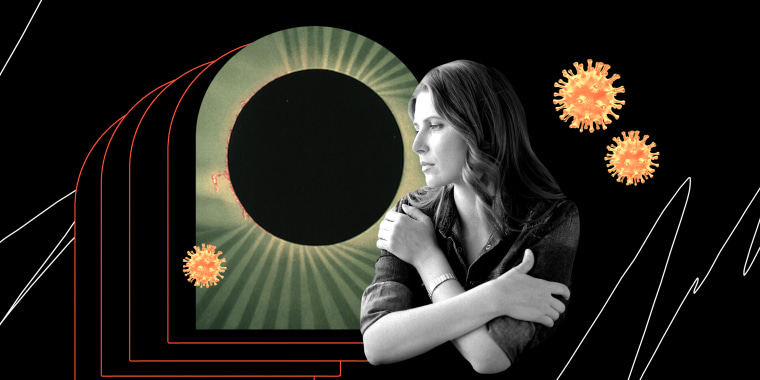Melissa Locker, a podcast producer, was pretty stressed back in March 2020 when the pandemic first struck. She lives in New York City, the first epicenter of COVID-19 in the U.S. Her freelance work dried up overnight and there was basically nothing to do but find things to do. Still, her stress felt manageable.
“Honestly, at the time, the whole concept of sheltering in place felt almost cute,” Locker told TODAY. “I decided to learn how to knit. I did a lot of puzzles, baked and took my dog for long walks. [The Trump administration] was telling us it would be basically over in a month. So I felt like, ‘OK, I’ll just hunker down and get through this.”
Nearly a year later, Locker is still mostly in lockdown and more stressed than she was last spring. Winter isn’t helping matters, as she can no longer escape on long dog walks or meet a friend for a socially distanced cup of coffee in the park.
“There’s no definitive light at the end of the tunnel anymore,” Locker said, noting that as a healthy, youngish person and not an essential worker, she’s low on the vaccine distribution list. “I’m just really tired and stressed and I don’t even care about baking or doing puzzles anymore. All I care about is work, which is stressful in itself because there’s no real sense of unplugging. I’m always looking at a screen, whether it’s to answer an email or watch Netflix.”
Locker is hardly alone in her stress. A new report issued by the American Psychological Association (APA) found that the average reported general stress level is, on a 1 to 10 scale, at 5.6 — slightly higher than the average general stress level of 5.4 in APA's May 2020 survey. Dr. John Duffy, a clinical psychologist in Illinois, is seeing droves of patients who are feeling more stressed out than ever.
“The way I frame it to clients is this: We have all been idling on high for almost a year now,” Duffy said. “We’re anxious whether we’re conscious of it or not — and most of us are not conscious of it. We are dealing with pandemic fatigue, and the truth is, there is no established therapy for a prolonged traumatic crisis that lasts this long that creates anxiety and fatigue at the same time. As psychologists, we’re leaning on proven techniques to combat stress, but in a way we're inventing the wheel here.”
In addition to pandemic fatigue, we’re also dealing with a tornado of other stressors: longer work days, a recession, home schooling, social isolation, relationships broken by political differences, and more. Dr. Andrew Mendonsa, a forensic psychologist in California, finds that this long exposure to trauma is creating a phenomenon akin to PTSD in a number of his patients.
“We're starting to see what we would typically see in people who were deployed in a war,” said Mendonsa. “Some of the trauma of losing loved ones to COVID, losing jobs or friendships are all traumatic experiences. The baseline we're at is one of fear, especially with new variants of COVID emerging and uncertainty around what is next with the vaccines.”
Mendonsa is also seeing behavior he likens to alert/alarm fatigue, originally a nursing term in hospitals, but which he feels applies to our situation now. When we’re constantly inundated with emergencies, from the COVID lockdowns to the Capitol Hill insurrection in January, we start to unintentionally tune it all out, which can then deepen our subconscious anxiety as we start to fear that we’re missing or ignoring needed information.
Stress-fighting tactics to help you cope during the pandemic
This is a lot to cope with, and as Duffy emphasized, there’s no playbook on how to get through it. But there are some proven stress-fighting techniques that he and Mendonsa recommended:
- Get a therapist: Typically this is reserved as the last step in stress attack — to be implemented when all else fails — but both Mendonsa and Duffy said this should be your first step. Booking a mental telehealth appointment is simpler and often affordable, with some insurance companies even waiving fees.
- Use mood-boosting apps: “Patients are giving me consistently positive feedback on mood lifting apps like Calm,” Mendonsa said. “They’re saying that they’re helping them stay afloat amid the daily stress.”
- Move, especially outside: It’s freezing in much of the country but Duffy said that’s seldom an excuse to not get outside for at least 15 minutes. “My wife and I bundle up and walk. No matter how much we dread it, we always feel glad we went out. It’s a way of making use of the day, and not just looking out at the world from inside.”
- Eat, exercise and sleep like there’s no pandemic: “Yes, this is a pandemic and nothing is normal, but that doesn’t mean it’s Thanksgiving weekend and you can just eat and sleep however you want,” said Duffy. “You need rules. I encourage people to act like the pandemic will end tomorrow, even if it won’t. You need to keep a structured and normal schedule.”
- Stop fighting what you can’t change: “What would it mean if you just accepted what is beyond your control in your life?” said Mendonsa. “This is a way of habituation. If I say don't think about a pink elephant, you will think of a pink elephant. This is the same. Stop telling yourself that you have to stop thinking about the pandemic or your stress because you'll end up in a vicious cycle. Accept it. Many things are out of your control right now, so just focus on controlling what you can.”




